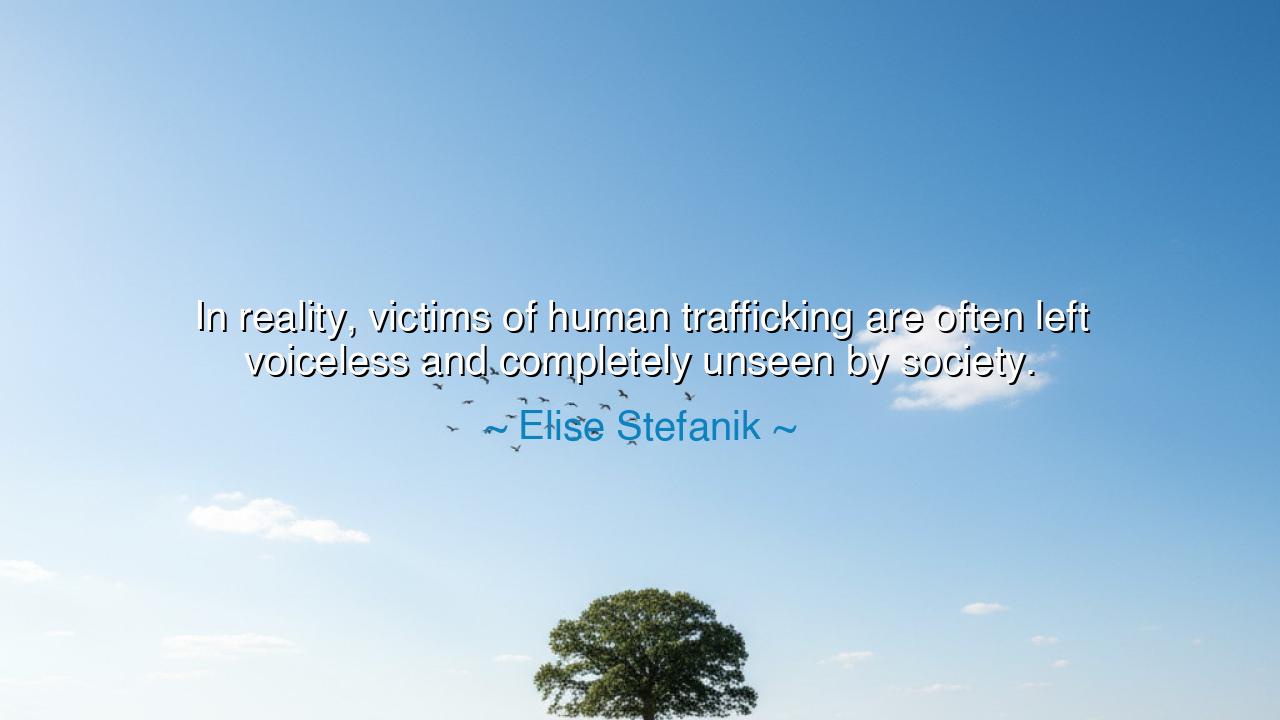
In reality, victims of human trafficking are often left voiceless
In reality, victims of human trafficking are often left voiceless and completely unseen by society.






Elise Stefanik once proclaimed with sorrowful clarity: “In reality, victims of human trafficking are often left voiceless and completely unseen by society.” These words expose a darkness that thrives not in distant lands alone, but in the very midst of modern civilization. They speak of men, women, and children reduced to shadows, stripped of dignity, silenced by fear, and forgotten by the world around them. In them, we hear an ancient lament, for as long as humanity has walked the earth, there have been those chained in silence while others looked away.
The meaning is sharp and grievous. A victim of trafficking suffers a double injustice: first, in the crime itself—being bought, sold, and used as though they were an object; second, in being unseen by the very society that should protect them. To be voiceless is to cry but not be heard, to struggle but remain invisible. Stefanik reminds us that human trafficking is not sustained only by the cruelty of exploiters, but by the indifference of the many who pass by without noticing.
History gives us countless mirrors to this truth. In the transatlantic slave trade, millions were stolen from their homelands, packed into ships, and forced into lives of unimaginable suffering. To the merchants and elites, they were invisible—numbers on ledgers, property in law. Their songs of sorrow and their whispered prayers were unheard by the world. Only centuries later did their cries pierce the conscience of society, sparking abolition movements that demanded recognition of their humanity. Yet how many lifetimes were crushed in silence before that awakening?
In modern times, we see another haunting example in the plight of trafficked women during times of war. During the Second World War, thousands of so-called “comfort women” were forced into sexual slavery across Asia. For decades afterward, their suffering was denied, hidden, and unacknowledged. They were voiceless, unseen by their nations and the world. Only when survivors began to speak in their old age did society begin to reckon with their pain. Their testimony reminds us that silence is itself a form of cruelty.
Stefanik’s words call us not only to grief but to vigilance. Human trafficking thrives in secrecy. Its victims are hidden in brothels, in fields, in factories, even in ordinary homes. They walk among us, but we do not see them. They want to speak, but fear binds their tongues. A society that fails to look for them, to listen for them, becomes complicit in their suffering. The unseen chains are strengthened by the blindness of the many.
The lesson is therefore a summons to action: to open our eyes, to sharpen our ears, to extend our hands. We must learn to recognize the signs of exploitation, to support organizations that rescue and restore, to give voice to those who cannot yet speak for themselves. To act is not charity, but justice. To remain silent is to join the ranks of those who profit from suffering.
Practical steps lie within the reach of all. Educate yourself and others about the realities of human trafficking. Refuse to tolerate the industries and systems that exploit vulnerable lives. Advocate for stronger protections, better enforcement, and compassionate rehabilitation for victims. In your daily life, choose to see the invisible, to speak for the voiceless, and to lift those who have been left in the shadows.
Thus, let Stefanik’s words echo in our hearts: “Victims of human trafficking are often left voiceless and unseen by society.” Do not allow this truth to remain a lament. Make it a call. For a people is only as noble as its willingness to defend the most vulnerable. And when the unseen are finally seen, when the voiceless are finally heard, then justice will flow like a river, and society will at last prove itself worthy of the name “human.”






AAdministratorAdministrator
Welcome, honored guests. Please leave a comment, we will respond soon